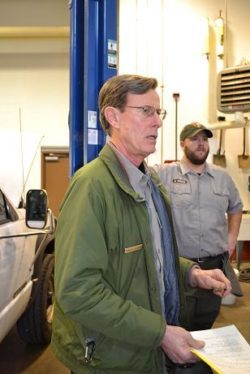In a practical, commonsense way Shenandoah National Park (SNP) employees have progressively worked to develop and adopt sustainable practices, including the use of soy-biobased products, for the last 15 years.

Kenneth Judd, mobile equipment servicer, is a big proponent of soy-based hydraulic fluid used in SNP hydraulic equipment and as transmission fluid because it is biodegradable and easier to clean up.
Nestled in the Blue Ridge Mountains of Virginia, SNP is home to the famous 105-mile-long Skyline Drive. SNP hosts an estimated 1.3 million visitors annually, making it one of the most popular of all national parks.
“The use of soy-biobased products as an element in our green purchasing program has been an effective way for the park to enhance our sustainability efforts and meet federal green procurement requirements,” says James Northup, who became the park superintendent in 2013.
“We want the actual people who use the products to try them. If they like the way they work, then we buy them and use them as much as we can,” says Charles Newton, lead sustainability coordinator and park safety officer.
Soy-based Hydraulic Fluid
A good example of this approach is soy-biobased hydraulic fluid. Since SNP first tried the product in the late 1990s, they have switched many of the 200-plus pieces of equipment that have a hydraulic system of one kind or another. The equipment ranges from huge trash compactor trucks, to long-arm mowers, backhoes and skid steer loaders. Maintenance activities on hydraulic system equipment utilize 150-200 gallons per year.
“Not only does the soy-based fluid work as well as its petroleum-based counterpart, the overwhelming advantage is that soy-based fluid is biodegradable and much easier to clean up if a hydraulic system leaks or a spill occurs. When you have more than 200 pieces of equipment, there are bound to be spills and leaks, so the ease of clean-up is extremely important. It’s not just the convenience factor, it’s also takes less time and thus is more economical and less damaging to the environment,” explains Newton.

Charles Newton has the overall responsibility for coordinating park sustainability efforts. Much of the effort to date starts in the shop where this photo was taken.
In the early years, new equipment sometimes had warranty issues with the use of the soy-based fluid, but, according to Shop Foreman Stan Cockrell, most manufacturers now recognize soy-biobased hydraulic fluid as safe and effective to use.
“In fact, the product is also approved for use as transmission fluid by many manufacturers so we also use it in that way whenever we can,” says Cockrell.
Biodiesel
SNP has used biodiesel in its more than 80 diesel vehicles for 10 years. As a government entity, SNP’s source for biodiesel is through the Department of Defense, Defense Logistics Agency. B100 is delivered to the fuel contractor who mixes it with petroleum diesel before delivery to the park as B20.
Hand Cleaner

Shop mechanic Robert Vorous loves the soy-based hand cleaner because it’s so much kinder to his skin.
A more recent addition is the use of soy-biobased hand cleaner for shop use. “I love it,” says mechanic Robert Vorous. “It cleans well and is far less harsh on my skin.”
More Soy-based Products Trials
In its effort to continually expand its sustainability efforts, SNP is currently in the trial stage of using additional soy-based products including paint strippers, parts cleaners, chassis lubes, and graffiti remover.
FACT/FILE
- For more information on Bio Hydraulic Fluid, Bio-Penetrating Lubricant, and Bio-Parts Cleaner/Degreaser visit www.renewablelube.com or call (330) 877-9982
- For more information on Soy Scrub Hand Cleaner and Soy Gel Paint Remover from Franmar Chemical visit www.franmar.com or call (309) 828-2900
- For More information on Soy EP Plus # 2 Grease from Environmental Lubricants Manufacturing and to find a distributor in your area visit www.elmusa.com or call (319) 824-5203
- For More information on Graffiti Remover from Soy Clean visit www.soyclean.biz or call (641) 522-9559
